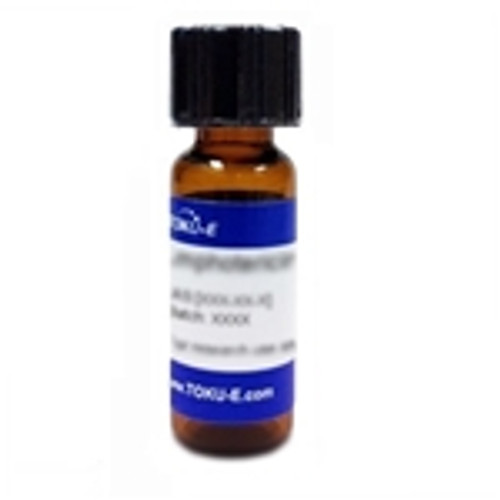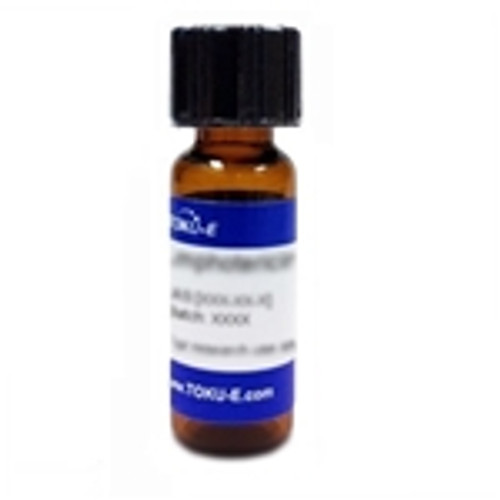Blasticidin S is a peptidyl nucleoside produced by several species of Streptomyces that was first isolated from S. griseochromogenes in 1958. Blasticidin S inhibits protein synthesis and is active against bacteria, fungi, nematodes, and tumor cells. The compound is used as a selection antibiotic for both eukaryotic and prokaryotic cells, and a marker for strain manipulation. It can be used in genome editing using the CRISPR/Cas9 system.
Blasticidin S is soluble in water, methanol, DMF or DMSO.
We also offer:
- Blasticidin S Hydrochloride (B001)
- Blasticidin S Hydrochloride Solution (10 mg/ml in 20 mM HEPES)(B006-B007)
| Mechanism of Action | Blasticidin S inhibits protein synthesis in prokaryotic and eukaryotic cells by binding to the ribosomal P-site which strengthens tRNA binding and slows down and prevents subsequent peptide synthesis.
Mechanisms of resistanceResistance to Blasticidin S is conferred by bsr, bsd, and bls resistance genes isolated from Bacillus cereus K55-S1, Aspergillus terreus, and Streptoverticillum spp, respectively. The bsr resistance gene is a 420 bp fragment and encodes a 15 kDa Blasticidin S deaminase which catalyzes the reaction of Blasticidin S to deaminohydroxyblasticidin S. Deaminohydroxyblasticidin S is a biologically inactive derivative of Blasticidin S and does not interact with or inhibit prokaryotic or eukaryotic ribosomes. The bsd resistance gene is a 393 bp fragment and also encodes a Blasticidin S deaminase enzyme which catalyzes a similar reaction to the BSR deaminase. A study by Kimura et al. found the transfection frequency with bsd to be 80X greater than with bsr when using FM3A cells. The bls gene resistance gene encodes an acetyltransferase which interacts with acetyl-coenzyme A and prevents Blasticidin S from inhibiting protein synthesis. |
| Spectrum | Blasticidin S is active against mammalian and prokaryotic cells. |
| Microbiology Applications | Blasticidin S can be used as a selection agent after transformation of prokaryotic cells such as E. coli. |
| Plant Biology Applications | Blasticidin S is an antifungal agent with particularly potent activity against the rice pathogen, Piricularia oryzae, for which it was used commercially in Japan. |
| Eukaryotic Cell Culture Applications | Blasticidin is selection antibiotic for both eukaryotic and prokaryotic cells. Resistance to Blasticidin is conferred by the following genes:
1) bsr (blasticidin resistance), from Bacillus aureus, which codes for Blasticidin-S deaminase. 2) bls (blasticidin S acetyltransferase), from Streptoverticillum spp. 3) bsd (blasticidin S deaminase), from Apergillus terreus. Typically, mammalian cells are sensitive to concentrations of 1-10 µg/ml, and bacteria to 25-100 µg/ml. Blasticidin can be used for systematic screening of cytokinesis mutants using an improved restriction enzyme-mediated integration system (REMI) in mutant Dictyostelium cells. |
| Molecular Formula | C17H26N8O5 |
| References |
Adachi H, Hasebe T, Yoshinaga K , Ohta T and Sutoh K (1994) Isolation of Dictyostelium discoideum cytokinesis mutants by restriction enzyme-mediated integration of the Blasticidin S resistance marker. Biochem. Biophys. Res. Comm. 205(3):1808-1814 Bento, FM (2004) Over expression of the selectable marker Blasticidin S deaminase gene is toxic to human keratinocytes and murine BALB/MK cells. BMC Biotechnol. 4 (29):1-10 PMID 15575952 Izumi M. et al., 1991. Blasticidin S-resistance gene (bsr): A novel selectable marker for mammalian cells. Exp.Cell Res.197:229-33 Kim H et al (2014) A co-CRISPR strategy for efficient genome editing in Caenorhabditis elegans. Genetics 197(4):1069-1080 PMID 24879462 Kimura M, Takatsuki A, Yamaguchi I (1994) Blasticidin S deaminase gene from Aspergillus terreus(BSD): A new drug resistance gene for transfection of mammalian cells. Biochim. Biophys. Acta. 1219(3):653-65 PMID 7948022 Lu K-T et al (2016) Ovatodiolide inhibits breast cancer stem/progenitor cells through SMURF2-mediated downregulation of Hsp27. Toxins 8(5):127 Svidritskiy E, Ling C, Ermolenko DN, Korostelev AA (2013) Blasticidin S inhibits translation by trapping deformed TRNA on the ribosome. PNAS 110(30):12283-12288 PMID 23824292 Takeuchi S, Hirayama K, Ueda K, Sakai H and Yonehara H (1958) Blasticidin S, a new antibiotic. J. Antibiot. 11(1):1-5 PMID 13525246 Yamaguchi I et al (1990) Expression of the Blasticidin S deaminase gene (bsr) in tobacco: Fungicide tolerance and a new selective marker for transgenic plants. Mol. Gen. Genet (2):332-334 PMID 2250657 |







